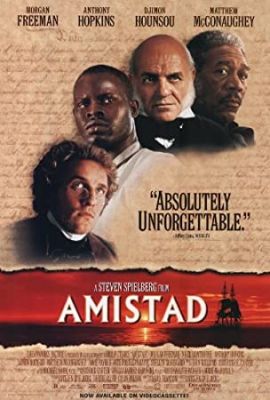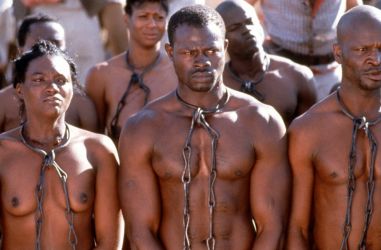Amistad (1997)
Amistad is an American historical-drama movie and recreation of the true story about an 1839 slave revolt on a small Spanish schooner La Amistad who ironically the Spanish word for “friendship.” This movie is directed by Steven Spielberg and released on December 10, 1997 in United State. This movie starring
- Djimon Hounsou as Sengbe Pieh / Joseph Cinqué
- Matthew McConaughey as Roger Sherman Baldwin
- Anthony Hopkins as John Quincy Adams
- Morgan Freeman as Theodore Joadson
- Nigel Hawthorne as President Martin Van Buren
- David Paymer as Secretary of State John Forsyth
Contents
Plot
Amistad is the name of a slave ship traveling from Cuba to the U.S. in 1839. It is conveying a load of Africans who have been sold into slavery in Cuba, accepted, and binded in the freight hold of the boat. As the boat is crossing from Cuba to the U.S., Cinque, who was a tribal leader in Africa, drives a revolt and assumes takes over the boat.They keep on cruising, expecting to discover help when they land. All things considered, when they arrive at the United States, they are detained as rampant slaves. They don't understand English, and it appears as though they are bound to slaughter their captors when an abolitionist lawyer chooses to take their case, contending that they were free residents of one more country and not slaves. The case finally gets to the Supreme Court, where John Quincy Adams makes an impassioned and persuasive plea for their release.
Based on the true story of America's slave trade, the film shows the saga of an 1839 mutiny aboard the slave ship, Amistad. Much of the story revolves a courtroom drama as lawyers for the slaves seek their freedom and return home. About a 1839 mutiny aboard a slave ship that is traveling towards the northeastern coast of America. A significant part of the story includescourt-room drama about the liberated person who drove the revolt.
Black Racism
This movie shows the torturous boat (La Amistad) journey in which an estimated two million Africans, on their way to being sold as slaves in Europe, South America, the Caribbean and the United States, were killed.[1] In this movie also depict in 1808 Congress passed legislation making it illegal to bring new slaves into the U.S. from Africa and how African-American slaves treated depended on their point of origin :
- If they had come directly from Africa, then they were free African men (who had legitimately defended themselves against illegal kidnapping).
- If they were from America, then they were slaves (who had killed their owners). It was eventually proven that they had been transported directly from Africa and were therefore free according to U.S. law.[2]
There is a horrible scene where the weaker captives are tied together and thrown over the side to drown with food running low on the boats, so that more food can be left for the others. And another sequence in which the mechanics of the slave trade are examined, as Africans capture members of enemy tribes and sell them to slave traders.[3]
Anti-Racist
Not every white people are bad. In this movie it potrays as in real life, there are good and bad white people, good and bad black people. it also shows that the British is ending the slave trade on a world scale.[4] There is a scene when Baldwin (white people), a shady property lawyer and abolitionist desperately defending the slaves in the court, "For Baldwin, the case represents a property, not a human rights, issue. Indeed, in the trial, positioned against Holabird (Pete Postlethwaite), the nasty government prosecutor, Baldwin tries desperately to prove that the Africans were not legally slaves, that they were “stolen goods” because they were born in Africa and illegally kidnapped from their homes."
"This verdict marked a major milestone for the white abolitionists. They had brought national attention to a great social injustice. For the first time in history, Africans seized by slave dealers had won their freedom in American courts."[5]
Reference
- ↑ Ann Hornaday. Revising movie history Film: 'Amistad' breaks with Hollywood stereotypes in its account of what happened to a boatload of Africans bound for slavery.. November 30, 1997. Baltimoresun. Retrieved January 25, 2021
- ↑ Amistad (1997). Missliberty. Retrieved January 25, 2021
- ↑ Roger Ebert. Amistad. December 12, 1997. Rogerebert. Retrieved January 25, 2021
- ↑ Amistad (1997). Missliberty. Retrieved January 25, 2021
- ↑ William Anderson. Amistad (1997): Movie Summary & Review. Schoolworkhelper. Rerieved January 25, 2021

